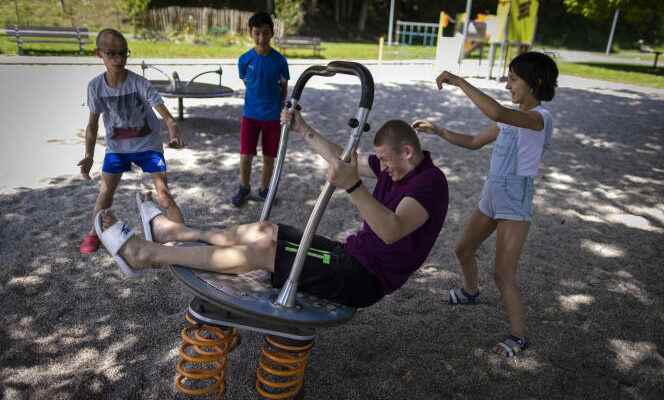Whereas nearly 6,500 civilians have been killed since the start of the invasion of Ukraine by Russia on February 24, thousands of Ukrainian children – some of whom had become orphans – were transferred to Russia to be adopted there, and thus later become Russian citizens. That’s what the New York Times and Associated Press (AP)which had already shed light on the number of civilians killed in the bombardment of the Mariupol theater – have endeavored to demonstrate in two precise and detailed investigations.
The American daily and press agency spoke with children, still in Russia or who had been able to return home, but also with their relatives and foster families. In Russia, neither politicians nor adoptive families hide it. On state television, they are presented as young Ukrainians abandoned and extracted from the war by Moscow, says the New York Times. Maria Lvova-Belova, ombudsman for children’s rights at the Kremlin, herself “adopted” a teenager from Mariupol and recounts, frankly, on Telegram how he came to love his new home after the sadness of leaving “the house in which he grew up, his friends and his dear Mariupol”.
But these massive transfers of children are a potential war crime, recall these investigations, whether these children are indeed orphans or not. Moving children to another country with a different culture, as an attempt to erase their national identity, can amount to genocide, supports AP. While many of these young Ukrainians do come from orphanages and foster homes, Russian and pro-Russian authorities have also deported children whose parents or legal guardians are claiming. Especially since in Ukraine, it is not uncommon for parents faced with illness, addiction or economic difficulties to place their children, temporarily or not. About 90,000 Ukrainian children are cared for in state establishments, according to the United Nations (UN).
“We do not take what is not already ours”
This policy of adoption responds to a more general strategy which aims to treat Ukraine as an integral part of Russia and to make the invasion of the country appear as a noble cause, according to the New York Times. The Russian government thus uses children – the most sick, poor and vulnerable – to serve its propaganda campaign and present Russia as a saviour.
Among the children interviewed by the New York TimesAnia, 14, fled her foster home under Russian fire in Mariupol, where she was recovering from tuberculosis. The bus which was to take her to Zaporizhia was diverted to a Russian checkpoint, says the teenager and other children present in the same vehicle, towards Donetsk, the eponymous capital of the administrative region occupied by the Russians since 2014. According to the American daily, the self-proclaimed pro-Russian republic is at the heart of Mr. Putin’s adoption policy.
In her escape, Ania was unable to take the sketchbook in which she kept her mother’s telephone number. The latter, contacted by the newspaper, did not know that her daughter was no longer in Ukraine. The girl now lives with a host family near Moscow, which she says treats her well. Soon it will officially become Russian. ” I do not want. My friends and family are not here”regrets Ania, who communicated with the American media by messages and voice memos.
the New York Times also met a resident of Salekhard, in Siberia. She adopted four Ukrainian children, aged 6 to 17 and all from Donetsk Oblast. “Our family is like a little Russia. Russia hosted four territories and [ma] family, four children », she claims. She says she is waiting for the arrival of a fifth Ukrainian and considers them all to be entirely Russian: “We don’t take what isn’t already ours. »
More than 10,000 children affected by these trips
To convince the oldest children, Moscow even dangles them with an exceptional life in Russia. “We were told, ‘If you want gadgets or clothes, let us know. We will buy everything from you. If you want you can leave [vers la Russie] and relax. We will show you Moscow. And if your parents abandoned you, it’s because they don’t need you. We will help you” »reports Timofeï, 17, to the New York Times.
Also interviewed by AP, the teenager says he was at summer camp in Mariupol with his five brothers and sisters – they are six children, aged 17 to 7, adopted on a regular basis by a Ukrainian, Olga Lopatkina – when the bombardments made them prisoners of the seaside resort, located about a hundred kilometers from their home.
With all communication cut off, the parents alerted the Ukrainian authorities and even went to Zaporijia, hoping to find their children there among the civilians evacuated from Mariupol. But the order to leave the area was also quickly given, and Olga and her husband Denys resolved to flee to France, the mother asking the governor of Donetsk to ” do not forget [s]are orphans”. The latter have in fact already been deported to Russia to be adopted again. A reality therefore far removed from the story of abandonment given by the Russian authorities to Ukrainian children, whom the war tore from their parents and threw into uncertainty. Timofeï and his brothers and sisters were finally able to join their family in France but, like many others, Ania is still in Russia.
The precise number of children thus sent to Russia for adoption is not known. The Russian authorities refused to respond to requests from the press. kyiv, for its part, does not keep a precise count, but understands that these children number in the thousands. After the Thursday publication ofa report by Amnesty InternationalOksana Filipishyna, independent expert on the protection of children’s rights, told the World that“to date, Ukraine has[vait] identified 10,764 children [séparés de leur famille] located in Russia and the occupied territories”. In April, Moscow announced that more than 2,000 children had arrived in Russia, the majority of them from orphanages and homes in territories occupied since 2014.
